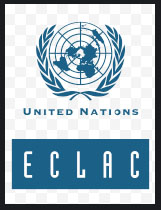In what must rank as one of the most high-profile recent lobbies on the international stage for more focused global attention to the challenges confronting the Caribbean region, Executive Secretary of the Economic Commission for Latin America and the Caribbean (ECLAC) Alicia Barcena on October 27th made a stirring case for the region’s development challenges to secure an enhanced level of global attention.
At a virtual panel discussion titled “Challenges for the Caribbean to build back better” staged as part of the proceedings for ECLAC’s 38th Session, Barcena said that the Caribbean as a region and more particularly the small island states could be heading for a “perfect storm” unless it receives remedial support from the international community. “Heavy indebtedness and a liquidity crisis, vulnerability to climate change and high expenditures due to the COVID-19 crisis are amongst the challenges confronting the region at this time, Barcena said.
“For years we have been promoting a debt relief initiative and the creation of a Resilience Fund for the Caribbean. We need an initial capitalization of US$6.9 billion dollars (12.2% of the regional debt) and access to concessional financing.”
A post-event ECLAC media release said that the stirring lobby for the Caribbean made by its Executive Secretary was executed as part of the institution’s ‘Caribbean First’ strategy which seeks to focus more studied attention on some of the unique problems confronting the region.
Global attention to issues of poverty and underdevelopment has traditionally focused primarily on regions of Africa and Asia primarily because those problems manifest themselves in the affected countries more starkly, notably in terms of poverty, malnutrition and high mortality rates. However, Barcena asserted that the categorization of the English-speaking Caribbean countries as ‘middle income’ “hinders their access to international financing under favourable conditions,” in effect retarding their development.
In a presentation which focused on efforts to restore the region to some semblance of normalcy in the post-COVID era, she said that while the Caribbean had made “enormous fiscal efforts to cope with COVID-19…the resources at its disposal are insufficient in the current context.”
Excluding Guyana, ECLAC is forecasting a 6.9% contraction in the sub-region’s GDP in 2020 on top of high levels of public debt.
ECLAC’s focus on the need for the Caribbean to receive a strong measure of international support in the wake of COVID-19 comes against the backdrop of its observation that tourism is one of the sectors most affected by the pandemic. At the same time it notes that regional COVID-19-related health expenses for the region amounted to US$260 million during the first quarter of 2020 alone. ECLAC has also indicated its concern that the socio-economic effects of COVID-19 in the region “reflect the underlying inequalities in access to education (and) financial assistance from donors has been inadequate given the enormous challenges that Caribbean countries face”. Bárcena warned that the Caribbean “sub-region’s liquidity crisis could become a solvency crisis, which would lead to a perfect storm.” Annually the Caribbean spends US$3 billion dollars on losses and damage caused by environmental disasters and the effects of climate change, which increases the fiscal burden on countries, Barcena said.






